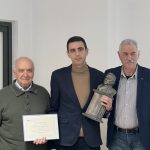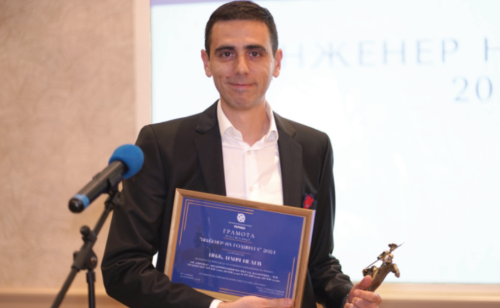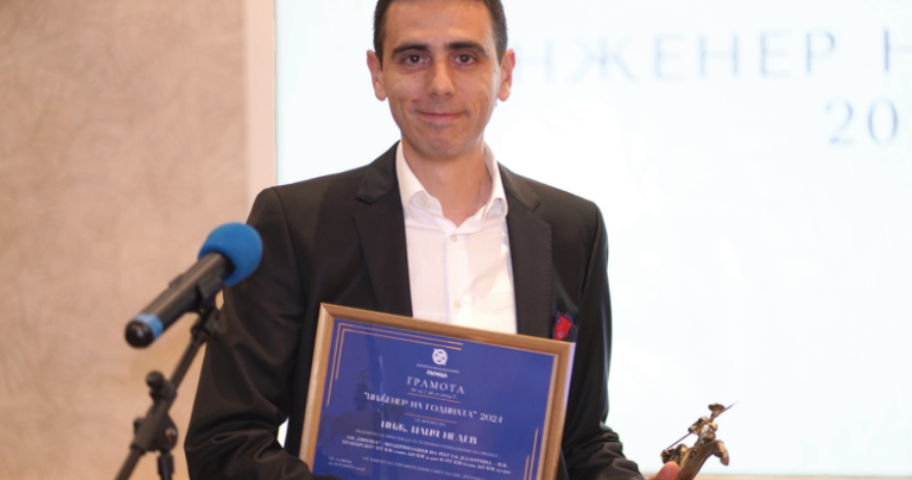
Инж. Илия Недев получи отличието „Инженер на годината“
November 27, 2024
The National Club of Veteran Builders presented the "Kolyo Ficheto" statuette to Eng. Iliya Nedev
February 21, 2025The award "Engineer of the Year" obliges us to maintain the high level we achieved in our next endeavors.
Eng. Iliya Nedev, chief engineer of "Bitumina GmbH - Bulgaria" EOOD: The award "Engineer of the Year" obliges us to maintain the high level we achieved in our next endeavors.
Source: Stroitel 12.12.2024
Author: Emil Hristov
The AM "Europe" section we worked on presented significant challenges.
Eng. Nedev, you won the grand prize of the Bulgarian Branch Chamber Roads (BBCR) "Engineer of the Year". Accept the sincerest congratulations from the team of "Stroitel" for this significant award. What does recognition mean to you?
BBCR's award is the result of the work and support of all colleagues, partners, and suppliers with whom I worked on the implementation of the AM "Europe" project - "Modernization of the I-8 road "Kalotina - p.v. Hrabarsko". It is a symbol of the efforts we have made and obliges us to maintain the high level achieved in our next endeavors.
Tell us a little more about the realization of AM "Europe". What challenges did you face?
Each project comes with its specifics. The section of AM "Europe" faced us with serious challenges. During its implementation, my colleagues and I joked that there were so many cases, and under other conditions, we would have needed several projects. We went through a lot of trials, but perhaps one of the main things we had to deal with when planning the construction was to keep the car traffic going. It is known that during certain periods of the summer, there is intense traffic from Western Europe along this route. The flow of heavy trucks also caused difficulties because long queues formed at times, which affected our operations. All the time, the construction was carried out near a railway line. It is about the railway section Kalotina - Sofia - Plovdiv - Svilengrad. Some of the construction and installation works had to be by precisely defined time windows, which were determined by the National Railway Infrastructure Company (NRI).
In several places, there were challenges with breaking the profile of the highway into rock escarpments. We were forced to use explosive materials and techniques. The very organization for the implementation of such activities is related to interaction with many institutions, including the Road Infrastructure Agency (RIA), the National Railway Infrastructure Company, the Main Directorate of the Border Police, and others. We had to synchronize the work with them to successfully implement this part of the project. We also did our best not to interrupt car traffic. For this purpose, we found a detour route where, with the help of RIA, we redirected the cars.
It is important to note that to complete the project, we had to make many crossings related to the passage of gas pipelines, as well as reconstruct water and sewer networks. There was also the crossing of low and medium-voltage power lines. At various points on the highway, they were aerial or underground. We also changed part of the city infrastructure, as a section of the route passed through Dragoman.
A key moment in the project was our work on a railway bridge located just before the border with Serbia. There was an old steel facility that trains used to run through. A temporary bridge had to be built. This allowed us to demolish the old facility and build a new one in its place.
The construction period of AM "Europe" coincided with the pandemic situation in the country and we had to approach differently in terms of the implementation of the activities. We were forced to accommodate the transportation of colleagues to the site with the restrictive measures that we strictly followed. It was necessary to quickly resort to the implementation of new technologies. The reason was that we drastically reduced the time spent on office work related to document processing. This led us to speed up the process and digitize it, which turned out to be extremely positive. Forced by the pandemic situation, we had to hold our meetings remotely. These are some of the innovations we have introduced and they have helped us improve the project execution process and be prepared for the future. We will certainly continue to use innovations in the future.
Taking stock of all the activities, I will say again that the whole project was full of many challenges.
You shared that during the construction you had to coordinate the various stages with the Road Infrastructure Agency, National Railway Infrastructure Company and Directorate-General for Border Police. How was the communication with them?
Getting along with them was not an easy task. In each of the listed institutions, different teams are responsible for a specific task. The overall goal was to take care of the safety of the existing infrastructure. The execution of the activities itself was complicated, but the preparation for the construction and installation works was much more difficult because we had to synchronize the different teams and meet the relevant requirements. There were specific things in each direction, but we managed to accommodate them.
Under normal circumstances, a project like this would have faced one or two of the challenges we went through, but the case studies allowed us to show our professionalism. We successfully dealt with them.
How do you rate the cooperation with the project team and Eng. Todor Todorov within the project?
During the "Engineer of the Year" ceremony, I mentioned the name of Eng. Todor Todorov. He had contact with our entire construction team. It was important for the approach, the good tone, and our relationship with the designer, which contributed to doing a quality job and finally congratulating ourselves on the achieved result.
Our interaction with the design team was excellent. Everyone was extremely responsive and together we solved the problems that arose. During the operations and meetings with the responsible institutions, it was sometimes necessary to add various additional details or to choose a certain technology so that it was compatible with the requirements of the relevant state structures. The design team helped us a lot in this direction.
I would also like to draw attention to the team of the contracting authority represented by the Road Infrastructure Agency, and especially Eng. Zlatka Peteva, Director of "Project Implementation" under OP "Transport and Transport Infrastructure 2014-2020", guided the activities. RIA prioritized the problems that arose during the realization of the object. They skillfully solved the most pressing cases so that we could complete all the construction and assembly works.
What innovations or technologies did you use in the implementation of the project that you consider key to its success?
Technologies are developing every day and becoming more common. During the construction of such a linear infrastructure project, usually, the most important and necessary thing is to be able to quickly digitize the information. My colleagues from the company in the Geodesy department did quite well with the use of modern devices. For the realization of the highway, we included a specially equipped drone, through which we made the necessary measurements. There were times when we had to observe or survey areas with difficult access.
Certainly, new technologies helped us significantly in the preparation and implementation of the project. Through them, we were able to digitize the terrain in more detail.
Tell us a little more about yourself and the company you represent.
I graduated from the University of Architecture, Civil Engineering and Geodesy (UASEG) with a major in "Transport Construction". I have worked on various large infrastructure projects, including the "Hemus" motorway, and the reconstruction of boulevards in Stara Zagora. In Serbia, I was involved in the construction of a 20 km road section. I have participated in the implementation of various plumbing projects.
"Bitumina GmbH - Bulgaria" EOOD deals with the construction of highways, roads, railway facilities, and water treatment plants, reconstruction of water supply and sewage networks, as well as high-rise construction.
I hold the position of chief engineer in the company's team. I led the part that we performed on AM "Europe". We managed to create a good team.
We are currently engaged in the implementation of the reconstruction of the railway line Verinsko - Ihtiman - Nemirovo. It is part of the route Sofia - Plovdiv. After the completion of the project, the section we are working on will be able to run trains at 160 km/h.
Currently, a big challenge for us is the implementation of a large-scale project in the field of residential construction - Teatralna Park Residence. Definitely, a very serious engineering resource is needed for its construction.
What inspired you to get into road construction?
Certainly, my family had a major influence on my choice of profession - they all work in the Construction sector. Even before I started my university studies, it was normal for me to visit various construction sites with my parents. Also, road construction has always been a topic of conversation in my family. We have even often discussed innovations in the industry. It often happens when we travel somewhere that we stop to pay attention to a section that has been built or one that has new technology applied to it. Everything intrigued me, and it was completely normal for me to choose to continue my studies at UASЕG.
What are your recommendations to young engineers who want to develop in the field of road construction?
The topic of young engineers is extremely important because in construction there is always a need for their energy. I have noticed that quite a few of them are motivated to get involved not only in the design and construction process but also in the management of the activities itself.
Unfortunately, in recent times it seems that the civil engineering profession is not so well appreciated and does not have a high enough reputation among students. But I can definitely tell them that the work is extremely interesting and dynamic because it is a mix of activities in the office and outside. It requires considerable intellectual work, while at the same time, a collision with the atmospheric conditions in the field is necessary. All this has its positive sides.
Recently, more and more young people are paying attention to the fact that constant work only in the office does not have a good effect on their physique.
One of the interesting things that impressed me from the very beginning. The highlight of my career has been visiting places where no infrastructure exists. You get to know the terrain and participate in the preparation of the implementation of a future road, for example. After months or a few years, with your participation, the entire landscape of the given place changes. You can't help but be pleased when you see that people and cars are already passing there. After a successful performance, you realize your contribution and feel satisfaction from a job well done and hard work.
What is your opinion about the current state of the road infrastructure in Bulgaria and what needs to be improved?
Perhaps we should compare the road network to a person's health. It is always necessary to make great efforts to keep us healthy, so it is with the infrastructure. We must constantly work on maintenance, implementation of innovations, and construction of new routes. The goal is for it to serve us for a long time.
Construction is also significant for better road safety in the country. We all need to pay attention to this issue and do more of it. I am a road safety auditor and I am involved in this case study. We constantly share with colleagues in the field different ways how to improve safety. We have commented that the main thing that can improve it is sufficiently early and timely information and training of young people. The topic should be discussed from a very early age in the family. Of course, various measures can be taken to bring us one step closer to reducing road casualties and saving more lives.
As a representative of the young generation of engineers, how do you see the future of construction?
What is very important and, in my opinion, needs to be done is to update the approach in which young people who choose to work in the Construction sector are trained. Currently, a large number of students are quickly losing interest in the profession. This is perhaps among the main things that should be paid attention to by universities training personnel for the industry. The process must be tailored to the interests of the young so that the desire for development can be ignited in them.
BBCR held its traditional technical seminar on November 26 at the Astoria Grand Hotel in Sofia. The forum brought together experts from the road construction industry, representatives of state institutions, and the scientific community. The issue related to the organization and management of the road network in Austria was touched upon. It became clear that they do not have a staffing problem there, which means that training on current issues through a modern set of skills that young people need to acquire has helped. This is a good example we can take, knowing what our country's needs are. We need to work to overcome the shortage of people, which is a challenge for the entire industry.
Regarding the future of construction, I can say that it will most likely be quite digitized. A serious digitization of the objects is ahead. It is increasingly seen that the use of the so-called information models will be standard in the next 10 years. I am convinced that many of those involved in construction will simply switch to new technologies without even considering it as some big event.
After being honored as Engineer of the Year 2024, what are your ambitions for the future and what do you wish for?
The next day after the ceremony of the Bulgarian Branch Chamber Roads, I was at work solving everyday tasks and challenges. So, my ambition is to continue working for the realization of successful objects. I wish above all health and the implementation of many new projects so that I contribute to the improvement of the infrastructure in Bulgaria.
I never set out with a single dream or a certain event that should happen to me. The very process of building and creating a new road or building is something I have always enjoyed. The good thing about this profession is that it is dynamic and something new happens every day. At the moment I have not set any goal, rather my desire is to gain as much knowledge and self-confidence as possible so that I can face the challenges.
Do you read "Stroitel" and what is your opinion of the publication?
Of course, I read it. The Bulgarian Construction Chamber’s publication is a good guide in the information environment. The topics you cover are quite synthesized and current. Also, what I like is that the articles are not politicized, so we can get professional and unbiased information about what is happening around us. I hope that Stroitel will continue to work in this way and I wish the team success.



